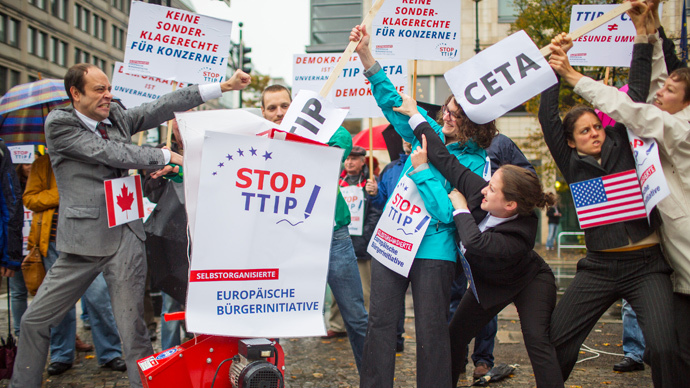Tens of thousands of people are flooding the streets of cities all over Europe on Saturday in mass rallies against a controversial trade agreement between the US and the EU.
Talks on the pact, called the Transatlantic Trade and Investment
Partnership (TTIP), started last February and, having been mostly
held behind closed doors, have raised widespread concerns in the
European Union and beyond.
Social networks have been mobilized for a mass campaign that has
been calling on Europeans and Americans to take action against
“the biggest corporate power grab in a decade.”
One of the organizers of Berlin’s demonstration, Michael Efler,
told RT’s Peter Oliver: “We are protesting here against the
free trade deal completely negotiated in secret, because they
give corporations more rights they’ve ever had in history.”
Protests were planned in 22 countries across Europe – marches,
rallies and other public events – in over 1,000 locations in UK,
France, Germany, Italy, Spain, Greece, Netherlands, Poland, the
Czech Republic and Scandinavian countries.
According to the international organization ATTAC, the
decentralized Day of Actions unites an unprecedented number of
civil society groups and individuals, social movements, trade
unions and rights defenders.
The main aim of the wave of protests is “to reclaim
democracy,” which in this case stands for putting an end to
the negotiations on three major trade agreements: the EU-US deal
(TTIP), the EU-Canada deal (CETA) and the trade in services deal
(TiSA).
A controversial free trade agreement, TTIP is destined to bring
down regulatory barriers. Its supporters promise a 100 billion
euro GDP growth for the EU, and almost $90 billion growth for the
US, as well as the creation of over 700,000 extra jobs in the US.
Opponents of TTIP warn that these figures are too optimistic,
however. While cheaper goods and services would deluge the EU,
the deal would create environmental problems, a loss of economic
sovereignty, and bring torrents of genetically modified food and
unemployment, they say.
In the UK, where over a dozen protests are taking place, people
fear for the future of the country’s public services – the
healthcare system, the education system and even the BBC may be
susceptible to interference from large US companies.
In London, British historian and investigative journalist Andy
Worthington told RT’s Harry Fear that people have reasons not to
trust politicians who have been reassuring them since 1980s, yet
“handing over more and more power to corporations.”
The trade agreement between the EU and the US could be finalized
by the end of this year.
The leaders of Canada and the EU signed the Comprehensive
Economic and Trade Agreement (CETA) this September, which is yet
to be finalized. It will remove over 99 percent of tariffs
between the two economies by 2016.
The Trade in Services Agreement (TiSA) is planned to liberalize
the trade of services such as banking and transport between 23
parties, initiated by the US. Its draft version was released this
June by WikiLeaks, which was followed by rising criticism.
Apart from the actions to stop TTIP, people from all over the
globe are participating in another protest on Saturday – Global
Frackdown Day, aimed at protesting against controversial oil and
gas technique of fracking.
Initiated by Food & Water Watch consumer right group, Global
Frackdown Day unites all continents in their struggle to protect
air, water, climate and communities from fracking.

























Laissez un commentaire Votre adresse courriel ne sera pas publiée.
Veuillez vous connecter afin de laisser un commentaire.
Aucun commentaire trouvé